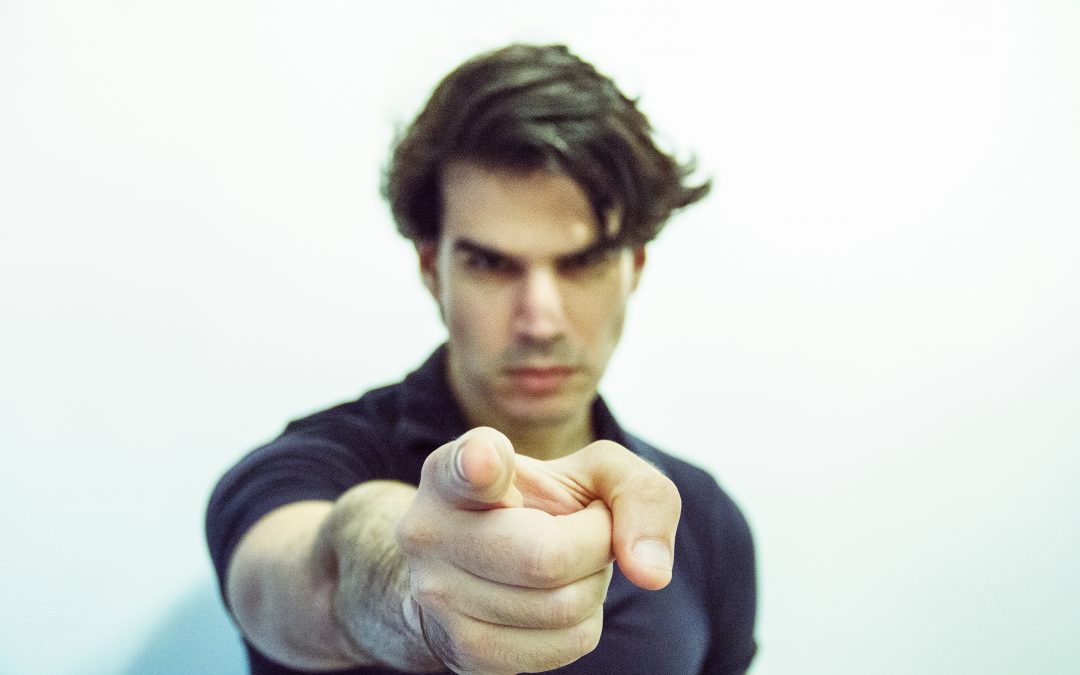As a society, we love to blame anyone or anything else for our problems. We blame our partners, ex’s, parents, and kids. We also point the finger at employers, friends, the government, society and even God!
We blame others because it lets us off the hook. It’s easy. It stops us facing up to our contribution towards the difficult situations we find ourselves in. We take the path of least resistance and simply abdicate from responsibility. It’s much less complicated when it’s someone or something else’s fault.
But blame is like drinking poison and expecting someone else to die. If you’re stuck in blame, you expect the other person to feel the same pain you’re feeling. But they don’t. Moreover, when you blame others, you give away your power to them. You place your happiness in their hands. So you stay stuck. You have no control, and you can’t move forward.
“But hang on, what if I’m a victim of crime or an abusive relationship? Is it all my fault?”
No, of course, it isn’t. But even in extreme situations, we still have the power and the opportunity to decide how we respond to it and how we live our lives as a result. The behaviour of others isn’t our responsibility, but we can decide whether they remain tangled up in our lives or not. Letting go of the blame doesn’t make what they did ok, but it gives us the space to move on.
“You can’t change what happens; you can only change how you respond to it.” Victor Frankl.
When we’re in blame, we’re living in the past. We replay a set of stories around previous experiences, to justify our behaviour. Interestingly, when I’m with clients, they talk a lot about Root Cause Analysis – tracing a problem back to its origin so that they can get to the bottom of what happened, why it happened and learn from it. It sounds good in theory but using Root Cause Analysis keeps them locked in blame. They aren’t looking to create opportunities to learn; they want to create a scapegoat and let themselves off the hook. What we ultimately uncover is that there’s a culture of blame in the company that needs to be looked at.
On the flip side, the airline industry is brilliant at truly having a ‘no blame’ culture. Using Black Box technology, they learn from failure, adapting not just machinery, but human processes and procedures, so that the same mistakes aren’t repeated. Matthew Syed’s book, Black Box Thinking, has some great examples of how, when we take away the blame, we can interrogate the error, not the person. And as a result, view failure differently.
If real change is to occur and progress is to be made at an individual, team or organisational level, the blame has to stop. Instead, look within. If we accept where we are and then look at what lessons can be learned, we can grow, develop and move forward.
Here’s how to stop playing the blame game.
1. Be open to the lesson – Stay vigilant when you get into blame. What is it that you’re avoiding? What can you learn and how can you grow from it? Our external world is a mirror of our internal world, and there will always be a lesson to learn to make a positive impact. Make yourself open to it.
2. Acknowledge your contribution – If you don’t understand you have a part to play, you will stay stuck, miserable, powerless and victimised. However, acknowledging your input is very different from blaming yourself for the situation you find yourself in.
3. Let go – Remember that blame keeps you in the past. You can kid yourself with Root Cause Analysis, but what is important, is to accept where you are now and then consciously decide how to move forward.
“The day you stop blaming others is the day you begin to discover who you truly are.” Anon.
Are you ready to let go of the blame game? Let me know in the comments below.
If you want to take a deeper look at what’s happening in your team please email hello@jocowlin.com to arrange a 30-minute discovery call.


